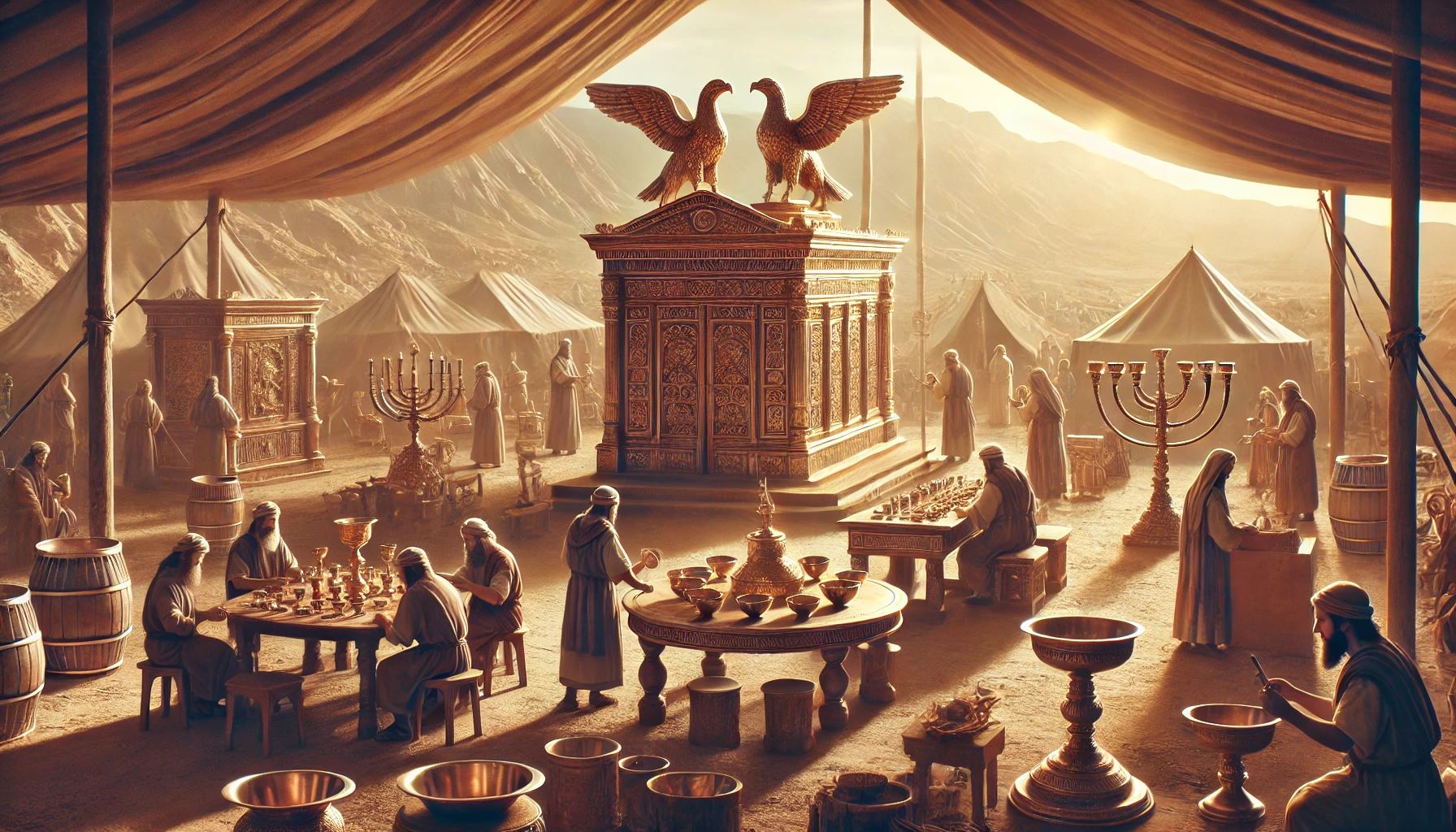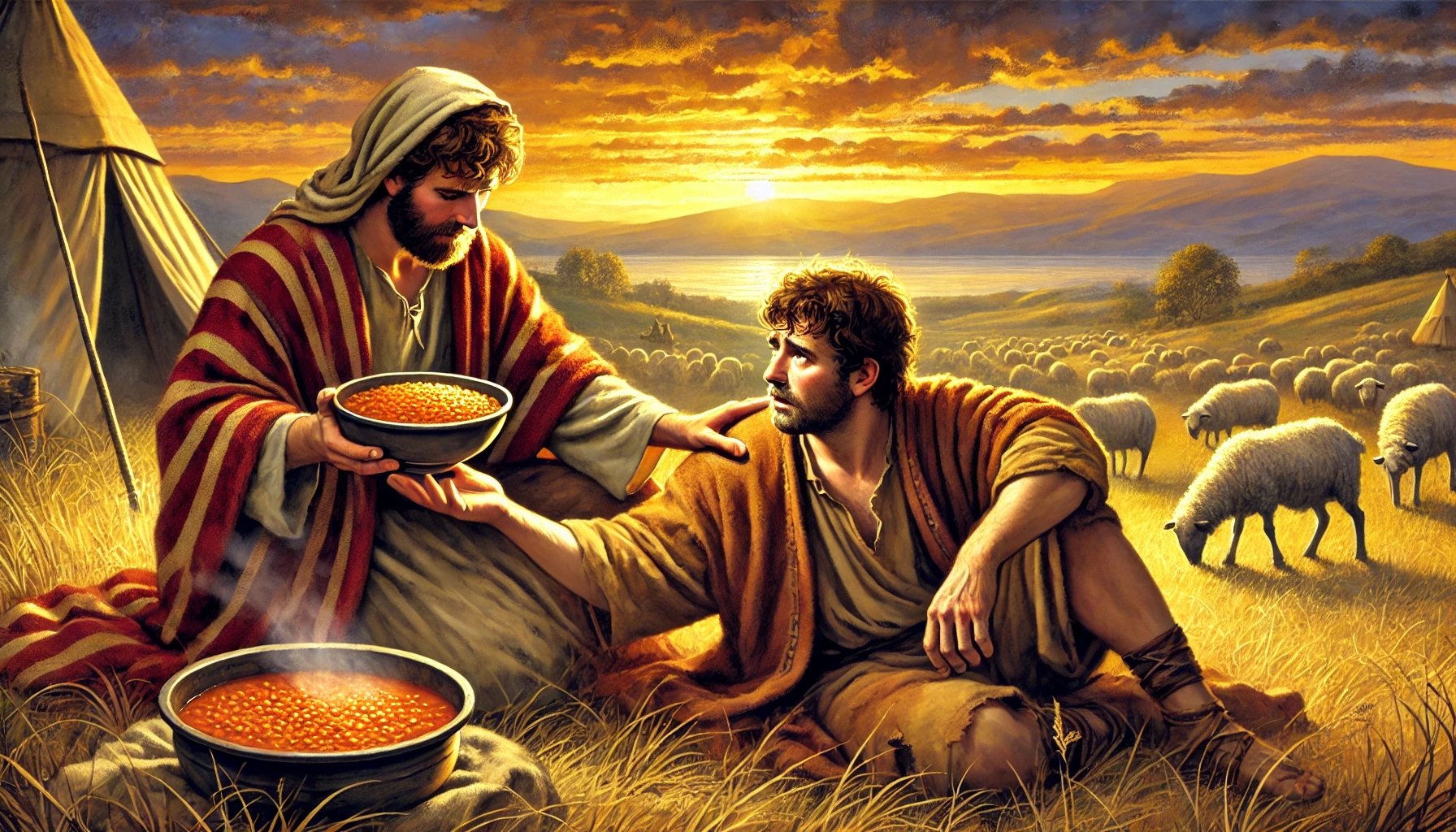
📅 July 12, 2025
📖 DAILY BIBLE READING
✨ Exodus 37 – Making God’s Presence Visible
⛺ The Sacred Art of Devotion – How Ordinary Work Becomes Part of God’s Plan
══════════════════════════════════════════════
📜 Bible Text – Exodus 37 (KJV)
1 And Bezaleel made the ark of shittim wood: two cubits and a half was the length of it, and a cubit and a half the breadth of it, and a cubit and a half the height of it:
2 And he overlaid it with pure gold within and without, and made a crown of gold to it round about.
3 And he cast for it four rings of gold, to be set by the four corners of it; even two rings upon the one side of it, and two rings upon the other side of it.
4 And he made staves of shittim wood, and overlaid them with gold.
5 And he put the staves into the rings by the sides of the ark, to bear the ark.
6 And he made the mercy seat of pure gold: two cubits and a half was the length thereof, and one cubit and a half the breadth thereof.
7 And he made two cherubims of gold, beaten out of one piece made he them, on the two ends of the mercy seat;
8 One cherub on the end on this side, and another cherub on the other end on that side: out of the mercy seat made he the cherubims on the two ends thereof.
9 And the cherubims spread out their wings on high, and covered with their wings over the mercy seat, with their faces one to another; even to the mercy seatward were the faces of the cherubims.
10 And he made the table of shittim wood: two cubits was the length thereof, and a cubit the breadth thereof, and a cubit and a half the height thereof:
11 And he overlaid it with pure gold, and made thereunto a crown of gold round about.
12 Also he made thereunto a border of an handbreadth round about; and made a crown of gold for the border thereof round about.
13 And he cast for it four rings of gold, and put the rings upon the four corners that were in the four feet thereof.
14 Over against the border were the rings, the places for the staves to bear the table.
15 And he made the staves of shittim wood, and overlaid them with gold, to bear the table.
16 And he made the vessels which were upon the table, his dishes, and his spoons, and his bowls, and his covers to cover withal, of pure gold.
17 And he made the candlestick of pure gold: of beaten work made he the candlestick; his shaft, and his branch, his bowls, his knops, and his flowers, were of the same:
18 And six branches going out of the sides thereof; three branches of the candlestick out of the one side thereof, and three branches of the candlestick out of the other side thereof:
19 Three bowls made after the fashion of almonds in one branch, a knop and a flower; and three bowls made like almonds in another branch, a knop and a flower: so throughout the six branches going out of the candlestick.
20 And in the candlestick were four bowls made like almonds, his knops, and his flowers:
21 And a knop under two branches of the same, and a knop under two branches of the same, and a knop under two branches of the same, according to the six branches going out of it.
22 Their knops and their branches were of the same: all of it was one beaten work of pure gold.
23 And he made his seven lamps, and his snuffers, and his snuffdishes, of pure gold.
24 Of a talent of pure gold made he it, and all the vessels thereof.
25 And he made the incense altar of shittim wood: the length of it was a cubit, and the breadth of it a cubit; it was foursquare; and two cubits was the height of it; the horns thereof were of the same.
26 And he overlaid it with pure gold, both the top of it, and the sides thereof round about, and the horns of it: also he made unto it a crown of gold round about.
27 And he made two rings of gold for it under the crown thereof, by the two corners of it, upon the two sides thereof, to be places for the staves to bear it withal.
28 And he made the staves of shittim wood, and overlaid them with gold.
29 And he made the holy anointing oil, and the pure incense of sweet spices, according to the work of the apothecary.
══════════════════════════════════════════════
🔵 Introduction
In Exodus 37, we encounter a different kind of passage—no dramatic miracles, no thrilling narratives, but detailed descriptions of furniture: the Ark of the Covenant, the lampstand, the altar of incense, and other items for the sanctuary. And yet, in these very details, we find a powerful truth: God Himself commissions people to create visible objects that reflect the invisible—symbols of His presence.
These verses show us that God is not only interested in great words or big actions, but in faithful, careful, and quiet work, done with a pure heart. A chapter that encourages us to see our lives, our gifts, and our everyday tasks as part of building His holy dwelling.
══════════════════════════════════════════════
🟡 Commentary
1. The Ark of the Covenant (vv. 1–9):
Bezalel constructs the Ark exactly as God instructed—acacia wood overlaid with pure gold, inside and out. The cherubim face each other with wings outstretched, covering the mercy seat.
🔑 Spiritual significance:
→ The Ark is the meeting place—God’s throne among His people.
→ Gold inside and out symbolizes purity—God sees both our hearts and our actions.
2. The Table of Showbread (vv. 10–16):
Also overlaid with gold, this table holds the “bread of the presence,” a sign of God’s provision and fellowship.
🔑 Spiritual significance:
→ God desires to dwell with His people and provide for them.
→ He invites us to His table—not as strangers, but as family.
3. The Lampstand (vv. 17–24):
A beautifully crafted lampstand of pure gold, with seven lamps—a symbol of light, life, and the Spirit of God.
🔑 Spiritual significance:
→ Jesus said, “I am the light of the world.”
→ We are also called to shine—consistently and purely.
4. The Altar of Incense (vv. 25–28):
A place where smoke and fragrance rise—a picture of prayer ascending to God.
🔑 Spiritual significance:
→ Prayer is not secondary—it is a sweet offering before the Lord.
→ Our praise, requests, and thanksgiving are like incense to His heart.
5. The Anointing Oil and Incense (v. 29):
Bezalel prepares the sacred anointing oil, following God’s exact recipe.
🔑 Spiritual significance:
→ Anointing signifies calling, consecration, and authority.
→ God anoints those He sends—even you, for your mission.
══════════════════════════════════════════════
🟢 Summary
Exodus 37 shows how wood, gold, and skilled hands became a dwelling place for God’s presence. Bezalel and the other craftsmen did not act out of personal creativity—but followed God’s plan down to the smallest detail. And in that obedience, God’s presence found space to dwell.
══════════════════════════════════════════════
💡 Reflection Prompt
God is still building a sanctuary today—not a tent of fabric, but a living temple made of people. Every believer is a “living stone” in this spiritual house (see 1 Peter 2:5). Our callings, our abilities, our work—they’re not secondary. They are part of God’s holy mission.
God is still looking for modern-day “Bezalels”: people with hands, hearts, and humility. You may not be a preacher or evangelist, but what you do can become sacred, if you dedicate it to Him.
══════════════════════════════════════════════
💭 Thought to Reflect On
“Would you approach your daily work differently if you knew it was part of God’s holy dwelling?”
~~~~~⛺~~~~~
📆 July 06 – 12, 2025
📆 WEEKLY SPIRIT OF PROPHECY READING
📖 Ellen G. White │ Patriarchs and Prophets – Chapter 15
✨ The Marriage of Isaac
📖 Read online here
══════════════════════════════════════════════
🔵 Introduction
In a world where personal freedom is often placed above wisdom and obedience, the story of Isaac’s marriage stands out as a radiant counterexample. It shows how God Himself takes the lead in one of life’s most important decisions: the choice of a spouse. Abraham, the father of faith, does not leave this matter to chance or mere emotion but trusts in divine guidance — and Isaac trusts him.
This event is not just a family story, but a powerful lesson about obedience, character formation, true love, and God’s blessing.
══════════════════════════════════════════════
🟡 Commentary
📌 1. The Spiritual Significance of Marriage
Isaac’s marriage was not just a personal matter — it had implications for God’s plan for humanity. Isaac was the bearer of the promise; from his line would come the chosen people and, ultimately, the Messiah. A marriage with a Canaanite woman would have endangered that spiritual mission, as these peoples were deeply immersed in idolatry.
➡️ Key thought: Marriage is a spiritual covenant — it shapes generations.
📌 2. Abraham’s Responsibility as a Father
Although old, Abraham takes full responsibility for Isaac’s marriage with great foresight. He sends Eliezer, his faithful servant, with a clear mission: the wife must come from their believing relatives — and Isaac must not travel to Mesopotamia.
Abraham’s trust in God’s guidance runs deep. He says with conviction:
“The Lord will send His angel before you.” (Genesis 24:7)
➡️ Key thought: Parental care and spiritual guidance are irreplaceable — especially in matters of the heart.
📌 3. Eliezer’s Spiritual Attitude
Eliezer does more than just set out — he prays. At the well, he asks God for a sign of kindness and helpfulness — traits fitting for a God-fearing life. Rebekah’s response to his simple request becomes the answer to his prayer.
➡️ Key thought: Those who pray sincerely can recognize God’s guidance — even in everyday encounters.
📌 4. Rebekah’s Decision – Free and Faithful Consent
Despite all the preparation, Rebekah’s own will is respected. When asked if she is willing to leave her homeland, she responds freely and confidently:
“Yes, I will go.” (Genesis 24:58)
➡️ Key thought: God leads — but He never forces. Obedience is always voluntary.
📌 5. The Beginning of a Blessed Marriage
Isaac’s gentle character and upbringing in the fear of God prepare him for a blessed marriage. Rebekah becomes his wife, and the Bible says:
“He loved her… and was comforted after his mother’s death.” (Genesis 24:67)
➡️ Key thought: True love grows in the soil of faith, loyalty, and mutual dedication to God.
══════════════════════════════════════════════
🟢 Summary
Isaac’s marriage was the result of divine guidance, wise care, and voluntary consent.
Abraham, Eliezer, Rebekah, and Isaac all acted in faith, in prayer, and in obedience.
This marriage became a symbol of domestic happiness and a life under God’s blessing.
══════════════════════════════════════════════
📢 Message for Us Today
Today, the choice of a life partner is often made emotionally and independently of God’s standards. The story of Isaac and Rebekah offers a different path:
Marriage is not a private adventure, but a sacred covenant in God’s presence.
Parents and spiritual mentors have an important role — their counsel is not a burden, but a protection.
Prayer and spiritual maturity matter more than appearances or fleeting emotions.
Those who seek God’s guidance will discover that He has prepared what the heart longs for.
══════════════════════════════════════════════
💬 Reflection Question
Are you willing to let God lead in your most important life decisions — even in love?
Do you see marriage as a spiritual calling or just a romantic ideal?
Parents: Are you shaping your children’s character with love and example — or just letting them drift?
Young people: Do you see your parents as spiritual guides — or just critics?
~~~~~⛺~~~~~
📆 July 06 – 12, 2025
📆 WEEKLY SPIRIT OF PROPHECY READING
📖 Ellen G. White │ Patriarchs and Prophets – Chapter 16
✨ Jacob and Esau
📖 Read online here
══════════════════════════════════════════════
🔵 Introduction
In Chapter 16 of Patriarchs and Prophets, we meet the twins Jacob and Esau — two brothers whose character and way of life could hardly be more different. Their rivalry is not centered on worldly ambition but on one of the most essential questions of the life of faith: How much does the spiritual mean to us — how valuable is God’s promise? It is a story about priorities, decisions, and their lifelong consequences.
══════════════════════════════════════════════
🟡 Commentary
1. Two Brothers – Two Life Attitudes
Jacob is reflective, future-oriented, spiritually inclined. Esau is impulsive, adventurous, focused on the here and now. Even in the womb, God announces that the older will serve the younger. While Jacob values the birthright as a spiritual inheritance, Esau nearly mocks it and carelessly sells it for a meal.
2. The Birthright: Responsibility and Blessing
It involved more than material possessions — it meant spiritual leadership, priestly responsibility, and the privilege of being in the line through which the Redeemer would come. This right carried great spiritual dignity — but also responsibility. Esau was indifferent to this. Jacob, by contrast, deeply desired it — but unfortunately tried to obtain it by deceit.
3. Rebekah’s Influence – Faith or Manipulation?
Knowing God’s promise, Rebekah does not wait on His timing but uses human scheming. Jacob obeys, but with a troubled conscience. The deception achieves the desired blessing — but at a high cost: family division, flight, decades of separation.
4. Isaac’s Turning Point – Human Will vs. Divine Plan
Although Isaac favored Esau, he recognized after the deception that God’s will had prevailed — and he affirmed the blessing upon Jacob. Human weakness is overridden by divine providence.
5. Esau – A Moment’s Decision
The tragic moment: Esau, who had long despised the spiritual blessing, now seeks it back with tears — too late. What moves him is not true repentance, but personal loss. His story becomes a warning to all who trade the eternal for the temporary.
══════════════════════════════════════════════
🟢 Summary
Jacob and Esau represent two attitudes toward God: spiritual striving versus carnal desire. While Jacob sought the right thing the wrong way, Esau rejected the right thing altogether. God’s plan is fulfilled despite human failure — but not without painful consequences.
══════════════════════════════════════════════
📢 Message for Us Today
How much do we value God’s promises?
In a world full of distractions, offers, and instant gratification, it is easy to be like Esau — to trade the eternal for the immediate — whether through compromise in our faith or giving up spiritual principles for social or personal “peace.”
This story warns us: spiritual blessings are no game. God’s gifts are holy. When we understand their value, we will neither treat them carelessly nor try to obtain them through improper means. God fulfills His promises — but in His way, in His time, through those who trust Him.
══════════════════════════════════════════════
💬 Reflection Thought
What decision I make today could impact my eternity?
Am I — like Esau — possibly trading the eternal for the immediate?
Do I trust God to uphold His promise without my interference — or, like Rebekah, am I tempted to “help Him out”?
Lord, teach me not to misuse Your gifts — and help me to value spiritual things above temporary gain.






















